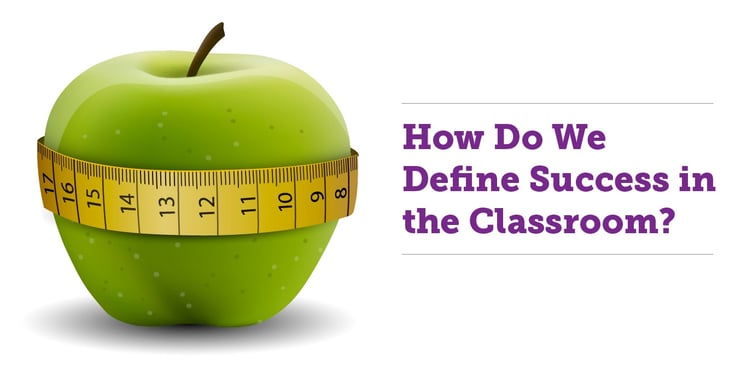
Looking at What Really Matters
If we truly value something, we measure it. This statement should be true, but too often in schools, it is not. Think about the things that we measure: state test scores, perfect attendance, grades, office referrals—the list goes on. It isn’t that these things aren’t important, it’s that they probably aren’t the most important.
Why not? I think most educators and parents know that these things we measure all too often don’t end up equaling student success later in life. There are correlations between good grades and post-secondary success, but aren’t there other more important factors that students need to be successful? If so, why aren’t we measuring those factors? This is really the key question for schools.
What Matters More?
When we think of “successful” students, we don’t necessary think about grades first. Much of what we do think about are non-academic factors such as being a good coworker, having perseverance and a good work ethic, and the ability to solve problems and think critically. These are skills that will help a person to be successful in college and in the workforce. Once a student lands their first job, their GPA becomes almost completely irrelevant in most industries.
So what can teachers and schools do to change the focus and measure what we value—or what we should be valuing? Here are some ideas:
Definition of Success
The first step is to develop an ongoing discussion around the definition of success. This is not an overnight process—a school must have a language of success and some indicators of what success means. If success means that students are responsible, what does this look like? It could be that the school measures and tracks the number of missing assignments each student has. This type of measurement is much different than a grade or attendance record since it takes time to develop in order to get it right. Different schools will have different definitions of what success means, so it can take multiple conversations to get all stakeholders moving in the right direction and speaking the same language.
Once the definition is set, it’s time to start measuring. Here are a few broad areas that could get you started in your classroom or in your school.
The Ability to Cooperate
This is a skill that's critical early on in our educational life and later on as we enter the workforce. This study from AJPH followed a group of kindergarten students for decades to track their success as adults. What it found was having early skills around cooperation, sharing, and the ability to focus in the classroom had long-term educational and health benefits. This isn’t surprising in and of itself, but it does emphasize how important early social skills are for students. Instead of an intense academic focus for young students, we need to focus on cooperation and working as a team. Most employers would say the same—coworkers need to be able to get along with others and work as a team in order to have success in the 21st century workplace.
Measurement: This can be measured both by teachers and students. Peer rating scales on projects give students a good chance for feedback about cooperation and working together. Teachers can also monitor and provide feedback about team activities. Team-building strategies and Kagan Cooperative learning strategies are great tools to use to increase students’ ability to cooperate.
The Ability to Self-Monitor
As students become adults, they have to have an ability to self-monitor their behavior. This independence is not something that is necessarily fostered in most schools. There are multiple ways to help students with this—and just assigning more homework really isn’t the key.
Measurement: This skill can be measured and monitored by doing a longer, ongoing project for students at the secondary level. This is one of the key indicators for “engaged students” used by Gallup for its nationwide student engagement survey. A student who can plan, organize, and see a project through to the end over time has the self-monitoring ability to do the same in college or in the workplace.
The Ability to Set Goals
Goal setting is one of the effective instructional strategies that we find in the research of Marzano. This has been around for a number of years and, as educators, we can see why it is critical for students to set goals in order to be successful.
Measurement: This isn’t about “grading” how well students set and achieve goals—it's about feedback and process. Having a program (we use Accelerated Reader) that allows students to monitor progress, set leveled goals, and achieve rewards when they reach their goal is a great tool for any school to have.
These are not the only skills that students need in order to be successful, but to target what will truly help students—and to then start measuring it—shifts the focus away from grades or attendance and toward social skills and authentic learning.
We understand how important it is to stay informed and inspired as educators. Subscribe to our Mimio Educator blog to make sure you don’t miss any of our informative articles!



